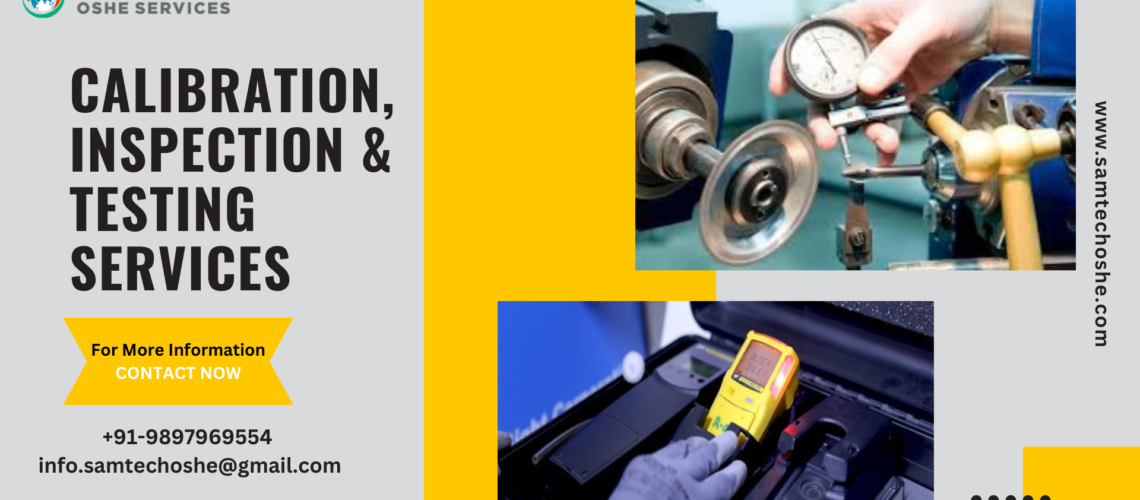Calibration, Inspection & Testing Services: Ensuring Accuracy and Quality in Modern Industry
September 9, 2024

In today’s highly competitive and technologically advanced industries, maintaining precision and ensuring the quality of equipment and systems are critical. This is where Calibration, Inspection, and Testing (CIT) services come into play. These services are essential for guaranteeing the accuracy of instruments, ensuring safety compliance, and promoting operational efficiency across various sectors such as manufacturing, healthcare, automotive, aerospace, and energy.
Calibration – The Foundation of Accuracy
Calibration is the process of comparing and adjusting the readings of an instrument against a known standard to ensure its accuracy. Precision instruments, over time, tend to drift due to wear and tear, environmental factors, or extensive use. Regular calibration is crucial to correct these deviations and maintain the reliability of measurements. Industries that deal with critical measurements, like aerospace or pharmaceuticals, rely heavily on accurate calibration to meet regulatory standards and avoid costly errors. Calibration ensures that instruments perform within specified limits and that data derived from them is trustworthy.
Modern calibration services use sophisticated equipment and follow strict international standards like ISO/IEC 17025, which ensures that measurements are traceable to recognized national or international standards. Calibration labs often provide services for a range of equipment, including pressure gauges, thermometers, multimeters, and industrial scales.
Inspection- Safeguarding Quality and Safety
Inspection services are a vital component of maintaining product quality and safety standards. These services involve the thorough examination of products, systems, or equipment to detect any defects, malfunctions, or deviations from the required specifications. Inspection can be performed during the production process or on final products and is often mandated by regulatory authorities to ensure safety and compliance.
Inspection is particularly critical in industries like construction, oil and gas, and automotive, where faulty components can lead to catastrophic failures. For instance, in the construction industry, regular inspections of cranes, elevators, and other equipment ensure that they are operating safely. Non-destructive testing (NDT) methods, such as ultrasonic, radiographic, and magnetic particle testing, are commonly used to inspect materials without causing any damage to the parts being tested.
Testing- Ensuring Product Performance
Testing services evaluate the performance, durability, and safety of products under controlled conditions. It ensures that products meet regulatory standards and function correctly in real-world environments. Testing is a key part of product development, helping manufacturers identify weaknesses, validate designs, and comply with safety standards before releasing products to the market.
Different types of testing services are available, depending on the industry and product requirements. For example, in the electronics industry, electromagnetic compatibility (EMC) testing ensures that devices do not interfere with other electronic equipment. In the automotive industry, crash testing evaluates the safety features of vehicles.
Testing services also support environmental compliance, ensuring that products meet environmental regulations, such as emissions standards, or adhere to sustainability requirements.
The Importance of CIT Services in Quality Assurance
Calibration, Inspection, and Testing services form the backbone of quality assurance processes across industries. Regular calibration ensures that instruments maintain their precision, inspection services identify and address potential safety risks, and testing confirms the performance and reliability of products. Together, these services help industries avoid costly downtimes, enhance operational safety, and comply with strict regulatory requirements.
For businesses, investing in CIT services is not just about meeting regulations; it’s about ensuring customer satisfaction, reducing risks, and maintaining a competitive edge in the market. As technology advances and industries become more reliant on precise measurements and high standards of quality, the demand for reliable CIT services continues to grow.
In conclusion, Calibration, Inspection, and Testing services play a critical role in ensuring that businesses operate efficiently, safely, and in compliance with industry standards. They are indispensable tools for companies striving to maintain quality, improve product performance, and uphold safety in an increasingly complex and regulated industrial landscape.




